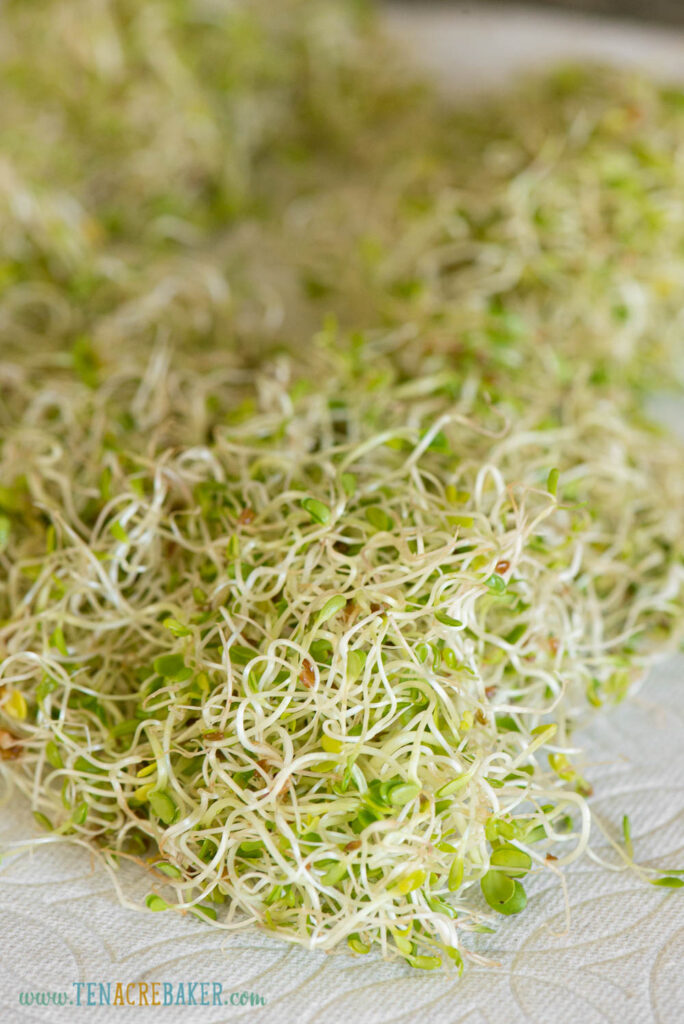Trader Joe's Alfalfa Sprouts Recall: Is Your Food Safe?
Are those seemingly innocuous alfalfa sprouts really safe to eat? The answer, unfortunately, is a resounding no, and a recent recall serves as a stark reminder of the potential dangers lurking within these tiny, verdant tendrils.
Alfalfa sprouts, those delicate, thin green shoots with their tiny clover-like leaves, are a common sight in salads, sandwiches, and wraps. Grown from the seeds of the alfalfa plant, they offer a perceived health boost with their low-calorie count and vitamin K content. However, their cultivation process makes them particularly susceptible to contamination, and this has led to a significant recall of "Nature's Choice Alfalfa Sprouts" sold at Trader Joe's stores across California and five other western states.
This recall, a matter of public health, necessitates a deeper look into the situation. The product in question, "Nature's Choice Alfalfa Sprouts," was sold in tubs and bore expiration dates of March 9th or earlier. The sprouts were packed by the J.H. Caldwell and Sons warehouse located in Maywood, California, a suburb approximately eight miles southeast of the Los Angeles Civic Center. This facility also supplied sprouts under the brands "Caldwell Fresh Foods" and "California Exotics."
The crux of the matter lies in the known risks associated with consuming sprouts. Sprouts, in general, are a recognized source of foodborne illness. This vulnerability stems from the warm, humid conditions required for their growth, which are also ideal for the proliferation of bacteria like Salmonella and E. coli. These pathogens can contaminate the seeds and, in turn, the sprouts themselves, potentially causing severe health complications.
The current recall is a testament to these risks. Authorities are urging consumers to discard any "Nature's Choice Alfalfa Sprouts" purchased from Trader Joe's stores within the specified region and with the affected expiration dates. This cautionary approach underscores the importance of understanding and mitigating the risks of foodborne illness.
The dangers of consuming contaminated alfalfa sprouts are very real. Salmonella infection, for instance, can cause fever, diarrhea, vomiting, and abdominal cramps. In severe cases, it can lead to hospitalization or even death, especially for vulnerable populations like young children, the elderly, and those with weakened immune systems.
This isn't the first time that alfalfa sprouts have been implicated in foodborne illness outbreaks. Previous incidents have led to recalls and legal actions. In one case, Marler Clark, a law firm specializing in foodborne illness cases, represented a client from California who filed a claim against Caldwell Fresh Foods. This claim was resolved in 2011, highlighting the enduring nature of the risks associated with this product. The current recall is a continuation of this pattern, a reminder of the need for ongoing vigilance.
This recall's scope extends beyond the immediate health concerns. It prompts a broader discussion on food safety practices within the sprout industry. The industry faces challenges in preventing contamination, given the nature of sprout cultivation. Thorough seed cleaning, stringent hygiene protocols during the sprouting process, and robust testing for pathogens are essential in safeguarding consumers. The FDA's role, and the need for the authority to enforce stringent standards, is also highlighted by this event.
Consumer awareness and informed choices are vital in managing the risks associated with sprouts. Individuals should be aware of the potential dangers and take measures to reduce their risk of getting sick. This includes thoroughly washing sprouts before consumption, cooking them to kill any potential bacteria, and avoiding sprouts if they have a compromised immune system or are otherwise vulnerable. Understanding the source of your food and whether or not it has been linked to any potential issues is key for healthy consumption.
Furthermore, the recall of "Nature's Choice Alfalfa Sprouts" raises questions about the availability of these products in various food establishments. While the recalled product was sold at Trader Joe's, it is relevant to consider the presence of alfalfa sprouts at other retailers, such as Sprouts Farmers Market and restaurants like Jimmy John's. While Jimmy John's might not have the product, consumers may still find them at other Trader Joe's locations or from bulk bins at markets, or other brands like Caldwell Fresh Foods, and California Exotics. Thus, it is crucial to confirm the source and safety of the sprouts before adding them to any meal.
While the immediate concern is public health, the broader implications extend to the food supply chain and consumer protection. The recall is a consequence of the ongoing issue. It is not an isolated incident, and should serve as a call for stricter regulations and consumer awareness. The FDA is continually reviewing its policies on food safety, and the recent recall is certain to contribute to their ongoing assessment. Consumer safety, and the food manufacturers that provide, are the top concern.
The case of the recalled alfalfa sprouts underscores the delicate balance between providing nutritious foods and protecting public health. While alfalfa sprouts offer certain nutritional benefits, the inherent risks associated with their production require vigilance from all stakeholders, including producers, retailers, and consumers. Its a potent reminder that the safety of our food is not something we can take for granted and requires constant vigilance and informed choices.
| Recall Information | Details |
|---|---|
| Product Name | Nature's Choice Alfalfa Sprouts |
| Retailer | Trader Joe's |
| Affected States | California and five other western states |
| Expiration Dates | March 9 or earlier |
| Packer | J.H. Caldwell and Sons |
| Location of Packing | Maywood, California |
| Potential Hazard | Salmonella |


